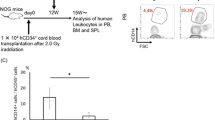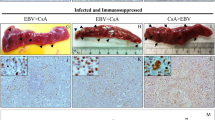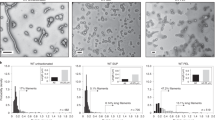Abstract
A virus preparation was isolated by Friend which produced a rapid erythroblastosis in certain strains of mice1. Although the original virus preparation induced a slight anaemia in the terminal stages of the disease, other variants, derived from various in vivo and in vitro passages of the original virus, were associated with polycythaemia2,3, and the different viruses were accordingly classified as FVA (Friend virus anaemia-inducing) or FVP (Friend virus polycythaemia-inducing). Another important difference between the two strains is that whereas FVP induces in infected mice cells that are capable of forming colonies in vitro in the absence of erythropoietin4,5, colonies formed by cells derived from FVA-infected mice are erythropoietin dependent6–9. Differences were also noted in the amount of haemoglobin present in erythroid bursts produced after in vitro infection of haematopoietic cells with FVP or FVA22. Both FVA and FVP virus stocks have been shown to consist of at least two different viruses: the spleen focus-forming virus (SFFVP or SFFVA), a replication defective virus; and the Friend murine leukaemia virus (F-MuLV), a replication competent virus which acts as a helper virus for replication of the defective SFFV6,23. Here, in an attempt to correlate differences in the biological effects of the SFFVs derived from FVP and FVA stocks with biochemical properties of proteins encoded by them, we have compared the post-translational processing of the envelope glycoproteins encoded by these viruses, and have found both qualitative and quantitative differences in the processing of the envelope glycoproteins of the two virus stocks.
This is a preview of subscription content, access via your institution
Access options
Subscribe to this journal
Receive 51 print issues and online access
$199.00 per year
only $3.90 per issue
Buy this article
- Purchase on Springer Link
- Instant access to full article PDF
Prices may be subject to local taxes which are calculated during checkout
Similar content being viewed by others
References
Friend, C. J. exp. Med. 105, 307–318 (1957).
Axelrad, A. A. & Steeves, R. A. Virology 24, 513–518 (1964).
Mirand, E. A. Science 156, 832–833 (1967).
Liao, S. K. & Axelrad, A. A. Int. J. Cancer 15, 467–482 (1975).
Horoszewicz, J., Leong, S. S. & Carter, W. A. J. natn. Cancer Inst. 54, 265–271 (1975).
MacDonald, M. E. et al. J. exp. Med. 151, 1477–1492 (1980).
Fagg, B., Vehmeyer, K., Ostertag, W., Jasmin, C. & Klein, B. in In Vivo and In Vitro Erythropoiesis: The Friend System (ed. Rossi, G.) 163–172 (Elsevier, Amsterdam, 1980).
Steinheider, G., Seidel, H. J. & Kreja, L. Experientia 35, 1173–1176 (1976).
Rossi, G. B. & Peschle, C. in In Vivo and In Vitro Erythropoiesis: The Friend System (ed. Rossi, G.) 139–149 (Elsevier, Amsterdam, 1980).
Evans, L., Nunn, M., Duesberg, P. H., Troxler, D. & Scolnick, E. M. Cold Spring Harb. Symp. quant. Biol. 44, 823–835 (1980).
Troxler, D. H., Ruscetti, S., Linemeyer, D. L. & Scolnick, E. M. Virology 102, 28–45 (1980).
Ruscetti, S., Linemeyer, D., Feild, J., Troxler, D. & Scolnick, E. M. J. Virol. 30, 787–798 (1979).
Linemeyer, D. J., Ruscetti, S. K., Menke, J. G. & Scolnick, E. M. Proc. natn. Acad. Sci. U.S.A. 78, 1401–1405 (1981).
Troxler, D. H., Boyars, J. K., Parks, W. P. & Scolnick, E. M. J. Virol. 22, 361–372 (1977).
Ruscetti, S., Troxler, D., Linemeyer, D. & Scolnick, E. J. Virol. 33, 140–151 (1980).
Ruta, M. & Kabat, D. J. Virol. 35, 844–853 (1980).
Rothman, J. E. & Dobberstein, B. J. Cell Biol. 67, 835–851 (1975).
Lingappa, V. R., Katz, F. N., Lodish, H. F. & Blobel, G. B. J. biol. Chem. 253, 8667–8670 (1978).
Burstein, Y. & Schechter, I. Biochemistry 17, 2392–2400 (1978).
Rothenberg, E., Donoghue, D. J. & Baltimore, D. Cell 13, 435–451 (1978).
Fan, H. & Verma, I. M. J. Virol. 26, 468–478 (1978).
Hankins, W. D. & Troxler, D. Cell 22, 693–699 (1980).
Troxler, D. H., Ruscetti, S., Linemeyer, D. L. & Scolnick, E. M. Virology 102, 28–45 (1980).
Author information
Authors and Affiliations
Rights and permissions
About this article
Cite this article
Ruscetti, S., Feild, J. & Scolnick, E. Polycythaemia- and anaemia-inducing strains of spleen focus-forming virus differ in post-translational processing of envelope-related glycoproteins. Nature 294, 663–665 (1981). https://doi.org/10.1038/294663a0
Received:
Accepted:
Issue Date:
DOI: https://doi.org/10.1038/294663a0
This article is cited by
-
Glycosylation of glycoprotein 55 encoded by the anaemia-inducing strain of Friend spleen focus-forming virus
Glycoconjugate Journal (1994)
Comments
By submitting a comment you agree to abide by our Terms and Community Guidelines. If you find something abusive or that does not comply with our terms or guidelines please flag it as inappropriate.



